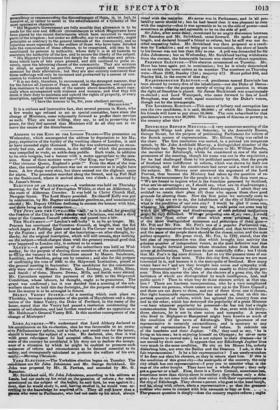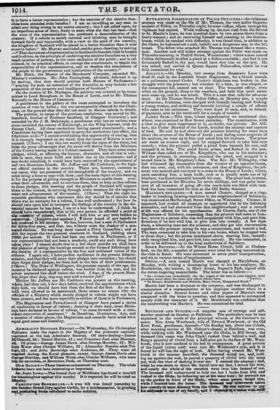'Er/MI:unbolt REFORM MEE TING.—A very numerous meeting of the Edinburgh
Whigs took place on Saturday, in the Assembly Rooms, George Street, for the purpose of petitioning Parliament for reform of the Scotch system of representation. Mr. Gibson Craig was called to the chair. The first resolution was moved, in a pointed yet temperate speech, by Mr. John Archibald Murray, a distinguished Member of the Edinburgh bar. He began by a playful allusion te Mr. William Dundas,
the member for Edinburgh, whom he considered as one of the main
promoters of the meeting, though his name was not in the remzisition ; for he had challenged them by his published assertion, that the people of- Scotland were indifferent to reform, Which was shown by. their not petitioning, and that his constitnents-had never said a word to him on the subject. Mr. Murray next answered the argument of the Lord
Provost, that because the Ministry had taken up the question of re-
form, it srnatinneeessary for the people to stir ,in it. .He then went on- " We ire boned to inquire what is the franchise possessed by Scotland; what areits,edvantages ; et., I should say, what are its disadvantages ; for 'unless an establishment has great disadvantages, I admit they are entitled4 to, retain . their place till those who oppose . them show good 7 grounds for.altering them. Now the' first . point we:naturally come to . is this : whet are we to do, the inhabitants of the city of Edinburgh— what is the condition of our own city ? -I -Would he •glad if some one,. , Whatave,r,:'S..filitital .opinions may be, would point Out some test. by
'
latiatir
cre.likcii tlie., lages, - and disadvantages • of tenth political institutions- ;
" iklititei d'iifi e'dinated. • - Witheen-preposing .orle af_:iny Owne::,1 won't:, , su6. mai(' !.."trtie ?limn.' either of those *hi& ,stersfr.peopneed i:hy . twn,.:.- . of the *at' 'distinguished - statesmen aud ,,politiciane of theiel,Onfeee . Mr. Pitt and Mr. Rix: Mr. Pitt 's .test of e .popular ;Parliament 100,. that the representatives should be freely elected, and that between iAem:" '..' and theaness of people there should be the closest union and the mots Perfect sympathy. His great rival, Mr. Fox, in 1.797, stated; that the - best plan co. jr,vre8entation was that which ,brought into activity the ' greatest number of .independent Votere; as the Meet defective was that ' which brought forward persons' whose situation takes from them -the -. peweisssf.deliberation., These tests do not niateeially differ; but I think that Mr. Fox '.8 is the more disthict. Let us try the 'present -state of our representation by these tests Take this city first, because we are most ...• interested in it, and because it is the Metropolis. of Scotland. How nia,ny voters. have we ? 'and are they brought into union and sytimatby_ with . their representatives ? In all, they anaonnt exactly to thiny,three per. , sena. -; slIOs this answer the :idea of the electors of a greet city, the in. . habitants of which are distinguished by much intelligence, Zeal, and ' public spirit ? Then in what way do those electors , arrive. at that sta. , tion ? There are fourteen incorporations, who by a very Complicated form choose Six persons, whose names are eent.up to the Town Cooacil ; and these are cut down to three, and out of these three one is'cltosen.„ Our right honourable representative has assured .us; that bn this int.• portanx .question of reform, which. has agitated the ,country from one ' end to the other, which has destroyed the popularity of a .great Minister —at least whatever popularity he poisesse&---he has not had a Single- ' coniniunication from ' his constituents. So that; even with histhirty. - three electors; he is' not in close union and Sympathy. A person ' who lived in Highgate or Hampstead might have known as much of the condition of the town of Edinburgh. This ignorance of our representative is • certainly extraordinary; and is contrary to any system' or representation I ever heard of before. It reminds, me _ of-the heathens and -their Jupiter. 'Oh,' they used to say, 'he is - livinrat his ease ; he is enjoying himself on Olympus ; he • never are .: what happens to mortal men ; he is not subject tntheir diseases—he is - not moved-by their cares.' It appears that our Edinburgh' Jupiter. lives :. very much in the same condition. He sits on his Mount Ida, nobody disturbing him„not even the Bellies and theDettcons. I ask, is' that a fair representation ? Is he a fair reptesentative ? . I ant sorelymistalcen if he does not elect his electors, as they in return 'elect -him. ' If this is the condition of this great city—the metropolis of the countey, thebnly city which has one repreeentativer pray you to consider what is the ease of the other burghs. They-have not a whole Jupiter ; they -only. geteequarteror a-h,alf. • First, there is tt Town Council, sometimeslese, sometimes more than thirty-three in nuMber ; they Choose only a- debar • gate ; they do not come into such close union witla their'repreeenMtive as , the city-of Edinburgh. They choose a person who goet to 'the. bead burgh, and lie,•along With others, elects a representative ; so that the greatest -; etrieber who come in contact with him amounts to fogr or five.; Thrpresent question is simply—does the countryeequarereform; ought
it to have a better representation ; has the exercise of the elective fran- chise been attended, with benefits ? I am as unwilling as any man to admit any thing wrong in my native country ' • but I am called upon, by an-imperious sense of duty, freely to state what the fact has been—that the state of the representation has produced a demoralization of the country. If a reform to satisfy rational and thinking men be brought forward fairly and impartially, with a view to the good of the country, the kingdom of Scotland will be placed in a better situation than it ever stood in before." Mr. Murray ooncluded,amidst great cheering, bymoving --J' That the system of represen tation in Scotland is founded, both in burghs and in shires, on the principle of conferring the elective franchise on a very small number of persons, to the utter exclusion of the public ; and is cal- culated, in its practical effects, to corrupt the constituents, to impair the responsibility of the representatives, and to weaken the attachment of the people to the government and institutions of the country." Mr. Black, the Master of the Merchants' Company, seconded Mr. Murray's resolution. Mr. John Cuningham, advocate; followed it up
by moving, that they should petition both Houses of Parliament- ' praying for such an extension of the franchise as may include a fair proportion of the property and intelligence of Scotland."
On the motion of Dr. Maclagan, the petition was ordered to be trans- mitted to Lord Brougham in the House of Lords, and to Mr. Thomas Kennedy in the House of Commons. A gentleman in the gallery of the room attempted to introduce the question of vote by ballot ; but was peremptorily silenced by the Chair- man, on the ground that they did not meet to discuss reform in details. The petition, in terms of the previous resolutions, was moved by Mr. Sandford, brother of Professor Sandford, of Glasgow University ; and seconded by Sir J. H. Dalrymple, a gentleman who has on various occa- sions contested the county of Edinburgh, on the Whig interest, with Sir George Clerk. All these resolutions having passed unanimously, and a Committee having been appointed to carry the resolutions into effect, the Chairman said—' I cannot avoid taking this opportunity of stating, that it is strongly impressed on my mind, that the cause of Reform is now to succeed. (Cheers.) I say this not merely from the signs of the times, but from the great advantages that the cause will derive from the Ministers of the Crown having made it a Cabinet measure. They have come under pledges, which, as affecting the honour, character, and all that is valu- able in man, they must fulfil and follow out to the uttermost ; and if any doubt remained, it would have been removed by the appointment of our two illustrious friends, Mr. Jeffrey and Mr. Cockburn, to the high- est official stations in the country. There are, however, enemies to our cause, who are posiessed of the strongholds of the country, and we must bring a force to cope with them ; and the main object of this meeting
is-for the purpose of giving strength to Ministers to enable them over- wane their adversaries, and to convince them, that so long as they adhere
to those pledges, this meeting and the people of Scotland will support them to the utmost, in carrying through every measure for the improve- ment and advancement of the country. (Cheers.) That the right ho- nourable gentleman who represents this city should be of opinion that there was no necessity for a reform, I can well understand ; but how he idieuld take upon him to interpret the feelings of the country in the die.
tatorial manner he has done' I am at a loss to understand. , I think he sliconid have remembered, that in his own person he afforded a prtiof of the, neoetisity of reform, which I will defy him or any 'roan besides to
aditrovellt- (Lasthalet,tAnd applause.) t never heard of any benefit he Lis rendered to his country. He has, however, had a seat in Parliament fthirty-five years, and that, too, without even the shadow of a con- tend, election. He was long since named a Privy Councillor; and at
thii day enjoys the two greatest sinecures in Scotland, yielding about 70.00./. per annum. If there had been any reform in Parliament, or if
our representation had not been a mockery, could any such thing have taken place ? / cannot doubt that in a few short months we shall have the pleasure ef seeing the hustings erected at the Cross of Edinburgh for
the election of a representative by the free and unbiassed voices .of the citizens. I again say, I have perfect confidence in the present Admini- stration, and that they will carry their pledges into execution ; but should their forget their pledges, let them look to the fate of their predecessors. (Cheers.) The Duke of Wellington, the greatest captain of the age, the moment he declared against reform was hurled from his seat, and his power scattered like chaff before the wind. 1 hope, if the present Minis- tersforget their duty, they may meet with a similar fate."
'Neither Mr. Jeffrey nor Mr. Cockburn was present at this meeting, syliere, had they not, a few days before, received the appointments which they hold, we should have had them the first of the first. As no de- tails were allowed to be mentioned, there seems no reason why the officials of a Ministry which stands pledged to reform might not have bsien present, and the more especially as neither of them is in Parliament, The Magistrates and Town-Council of Glasgow have passed a series of, resolutions in favour of reform ; deeming it their duty, since Minis- tem have declared in favour of reform, "to come forward with a coin- cident expression of sentiment." At Dumfries, Dunbarton, "Ayr, and a number of other places, the Magistrates and councils have acted with. etual good sense and liberality.



























 Previous page
Previous page